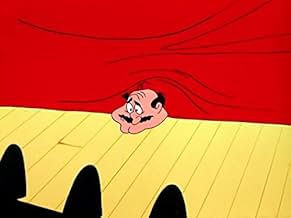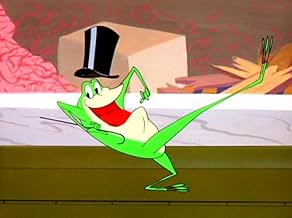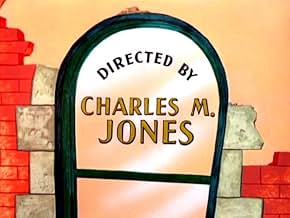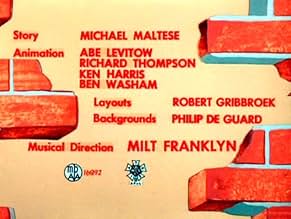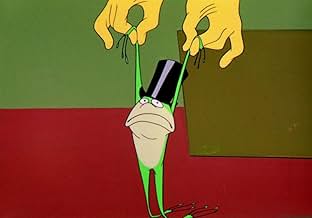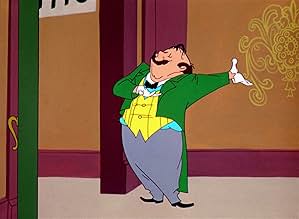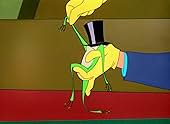AVALIAÇÃO DA IMDb
8,4/10
6,4 mil
SUA AVALIAÇÃO
Adicionar um enredo no seu idiomaA man futilely struggles to make his fortune with a frog that sings and dances, but only when it is alone with the owner.A man futilely struggles to make his fortune with a frog that sings and dances, but only when it is alone with the owner.A man futilely struggles to make his fortune with a frog that sings and dances, but only when it is alone with the owner.
- Direção
- Roteirista
- Artista
- Prêmios
- 1 vitória no total
William Roberts
- Michigan J. Frog
- (canto)
- (não creditado)
Avaliações em destaque
10llltdesq
Although some consider What's Opera, Doc? the perfect Chuck Jones cartoon, I would argue that this is the best choice to represent Chuck Jones boiled down to one short. Jones did a great variety of work, but he was at his best with little or no dialog, a visual cartoon that wasn't just slapstick visuals. Put a character into a situation where they either see something they want and grab it (or try to), throw in the law of unintended consequences, stir in a little bad luck and stand back to catch the fireworks! A one-shot cartoon that made its lead character a star. Think about the impact a short like that as to have had over nearly 50 years to accomplish a feat like that! To top it off, it's a morality play in 7 minutes. The more things change, the more they stay the same! Great short, an essential work in the sub-genre of the animated short. Most highly recommended!!!!
Oh what a wonderful surprise this cartoon was. It is just so irresistible and endearing, not to mention funny and charming, and is just a froggin' masterpiece. The song "Hello ma baby, hello ma honey" is not only catchy but also memorable, I am still humming now writing this review. The other songs go without fault and the dancing routines are slickly done with lots of pizazz. The animation is spot on, with beautiful backgrounds, sharp character features and lovely colours. Michigan is a great character. Sung marvellously by Bill Roberts, he is charming, likable and sweet for a frog. The story is simple and well told, and its simplicity added to the charm that this gem has. All in all, wonderful and a must see! 10/10 Bethany Cox
What is there to say about Chuck Jones's 'One Froggy Evening' that hasn't been said already, not just one of the greatest cartoons ever made but one of the best things to ever happen anywhere ever! The story of a demolition worker who discovers a singing frog in the cornerstone of a building and attempts to exploit the creatures talents for profit, 'One Froggy Evening' is often called "the 'Citizen Kane' of animated shorts". That level of artistic worth is not an exaggeration. Everything, absolutely everything, is perfect about 'One Froggy Evening'. For one, the timing is astonishing. Jones tells the story (from a uniquely brilliant script by Michael Maltese, the author of many of the greatest cartoon scripts of all time) completely silent apart from the singing of the frog, who bursts into song at precisely the most hilarious moments possible.
Aside from being side-splittingly funny, 'One Froggy Evening' also works on a deeper level as a profound parable about greed. Presented with this wondrous of a singing frog, the demolition worker's immediate and only impulse is to use it to make money. To his ever-growing frustration, the frog will only sing in his presence. Despite his obsession with money, the demolition worker is extremely sympathetic and the audience shares in his pain even as they howl with laughter at his misfortune. The cartoon ends with another poor sap about to make the same mistakes, showing that no matter how much we progress as a society, greed is a constant in human beings. One element that is not often mentioned is the haunting quality of 'One Froggy Evening'. There's a sense of the supernatural in both a singing frog and a frog that can last for years sealed inside the cornerstone of a building, which always leads me to think of the frog in slightly more sinister terms, as a karmic lesson enforcer! The final image of 'One Froggy Evening' coupled with the distant echo of the frog's song always sends a shiver down my spine.
Aside from all this, there's the wonderful animation and the glorious soundtrack. From the moment the frog leaps out of the box, his back foot slipping a couple of times, he is one of the great animated creations. His ability to snap from spellbindingly charismatic showman to the most uninspiring and ordinary croaker you've ever seen is both hilarious and impeccably achieved. The demolition worker, meanwhile, goes through a wonderful range of Chuck Jones's trademark expressions. The music is great throughout, with a virtuoso performance from singer Bill Roberts who sings a range of classic Tin Pan Alley songs, a snatch of opera and, best of all, a cracking original composition by Chuck Jones and Michael Maltese themselves. Called 'The Michigan Rag', the song is not only the best and catchiest in the whole cartoon, it also provided a name for the frog character when, overwhelmed by the popularity of the film and inundated with requests for the character's name, Jones dubbed him Michigan J. Frog. Despite this popularity, Jones wisely refused to use Michigan in any other cartoons, ensuring 'One Froggy Evening' remains a true one-off and one of the greatest strokes of genius animation has ever seen.
In the interests of keeping it brief, I'll leave it there but I could gush about 'One Froggy Evening' for pages and pages. It really is a landmark piece of film history and more than justifies its appearance on every single list of greatest animated cartoons that's worth a damn.
Aside from being side-splittingly funny, 'One Froggy Evening' also works on a deeper level as a profound parable about greed. Presented with this wondrous of a singing frog, the demolition worker's immediate and only impulse is to use it to make money. To his ever-growing frustration, the frog will only sing in his presence. Despite his obsession with money, the demolition worker is extremely sympathetic and the audience shares in his pain even as they howl with laughter at his misfortune. The cartoon ends with another poor sap about to make the same mistakes, showing that no matter how much we progress as a society, greed is a constant in human beings. One element that is not often mentioned is the haunting quality of 'One Froggy Evening'. There's a sense of the supernatural in both a singing frog and a frog that can last for years sealed inside the cornerstone of a building, which always leads me to think of the frog in slightly more sinister terms, as a karmic lesson enforcer! The final image of 'One Froggy Evening' coupled with the distant echo of the frog's song always sends a shiver down my spine.
Aside from all this, there's the wonderful animation and the glorious soundtrack. From the moment the frog leaps out of the box, his back foot slipping a couple of times, he is one of the great animated creations. His ability to snap from spellbindingly charismatic showman to the most uninspiring and ordinary croaker you've ever seen is both hilarious and impeccably achieved. The demolition worker, meanwhile, goes through a wonderful range of Chuck Jones's trademark expressions. The music is great throughout, with a virtuoso performance from singer Bill Roberts who sings a range of classic Tin Pan Alley songs, a snatch of opera and, best of all, a cracking original composition by Chuck Jones and Michael Maltese themselves. Called 'The Michigan Rag', the song is not only the best and catchiest in the whole cartoon, it also provided a name for the frog character when, overwhelmed by the popularity of the film and inundated with requests for the character's name, Jones dubbed him Michigan J. Frog. Despite this popularity, Jones wisely refused to use Michigan in any other cartoons, ensuring 'One Froggy Evening' remains a true one-off and one of the greatest strokes of genius animation has ever seen.
In the interests of keeping it brief, I'll leave it there but I could gush about 'One Froggy Evening' for pages and pages. It really is a landmark piece of film history and more than justifies its appearance on every single list of greatest animated cartoons that's worth a damn.
10DButcher
"Greed" is one of the great American classics, but so often we limit ourselves to thinking of a film as a multi-hour feature film with live actors. In "One Froggy Evening" Chuck Jones tells the story of a construction worker demolishing a building and discovers a frog in the cornerstone. A SINGING FROG. Naturally, the first impulse is to make money on the frog. The only problem, the frog will only sing for this one guy. Not paying crowds, not talent agents, ONLY HIM. Slowly he is driven mad, not so much by the frog but by his own failed plans with the frog. Failing to recognize the special gift he has, he sees the building going up and sticks the frog back into the cornerstone. Years pass, and when the laser demolition-man is vaporizing the building with his 21st century technology, what does he find? A SINGING FROG. "You know," he thinks, "I could make some money." And so the cycle continues. People of any time are the same, they never learn. There's your moral. Chuck Jones does in 7 minutes what Von Stroheim took 7 hours to do. A genuine masterpiece of animation.
10Zailig
The last two times I saw One Froggy Evening it was in a censored version. In the original, the guy rents a theatre to show the singing frog and peppers the building with posters but no-one comes. He puts out a "free admission" sign but still no-one comes. He then puts out a "free beer" sign and is trampled by the crowd that rushes in. In the censored version, the "free beer" sign is cut. This is not only a stupid thing to do in itself; it also makes no sense since there is no reason why crowds would rush in so enthusiastically to see the singing frog if the only attraction was free admission. The whole point is that no-one believes in the singing frog. Who has committed this stupid act of vandalism and why -- and can we do anything about it?
Você sabia?
- CuriosidadesSteven Spielberg once described this as "the most perfect cartoon ever made," as well as "the Cidadão Kane (1941) of the animated short."
- Erros de gravaçãoWhen the owner of the frog gets thrown out of the talent agency, there's a hand-print on the wall to the side of the door he is thrown from. In the next shot it's gone.
- Citações
Michigan J. Frog: [singing] Hello, my baby / hello, my honey / hello, my ragtime gal. / Send me a kiss by wire / baby, my hearts on fire / if you refuse me / honey, you'll lose me / then you'll be left alone / Oh baby, telephone and tell me I'm your own.
- Versões alternativasIn some TV airings, the scene in which the workman places the "Free Beer!" sign outside the theater to attract customers is deleted.
- ConexõesFeatured in Chatterbox! (1977)
Principais escolhas
Faça login para avaliar e ver a lista de recomendações personalizadas
Detalhes
Bilheteria
- Faturamento bruto nos EUA e Canadá
- US$ 14.753
- Fim de semana de estreia nos EUA e Canadá
- US$ 12.285
- 16 de fev. de 1998
- Faturamento bruto mundial
- US$ 14.753
- Tempo de duração7 minutos
- Mixagem de som
- Proporção
- 1.37 : 1
Contribua para esta página
Sugerir uma alteração ou adicionar conteúdo ausente


